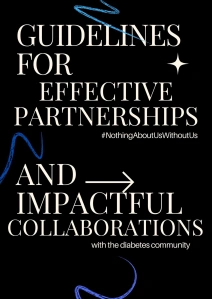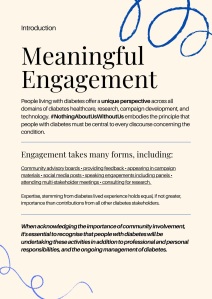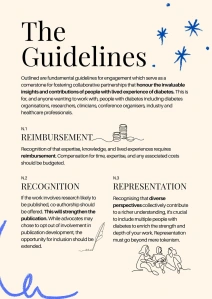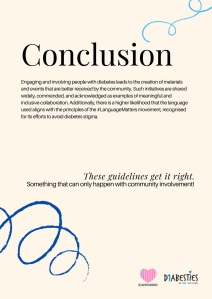You are currently browsing the category archive for the ‘Advocacy’ category.
There’s been a lot said about AID equity over the last few weeks. Actually, way longer than that. The momentum may have ramped up since a meeting at ATTD in Florence, but this has been something that the community has been speaking about for ages. In fact, I found a policy document advocating for pump access for all people with T1D from ten years ago, and I spoke at its launch in Parliament House . In there is a direct quote from me: ‘I decided to start using an insulin pump because my husband and I wanted to start a family. I knew of the importance of tight diabetes management prior to and during pregnancy. Insulin pump therapy gave me the ability to tailor and adapt my insulin doses to provide me with the best possible outcome – a beautiful healthy daughter.’
For the last six years I’ve been talking about how transformative AID has been with quotes like this: ‘Short of a cure, the holy grail for me in diabetes is each and every incremental step we take that means diabetes intrudes less in my life. I will acknowledge with gratitude and amazement and relief at how much less disturbance and interruption there is today, thanks to LOOP (AID).’
But enough from me. This is an issue that the T1D community owns and is engaged in. Last week at the #dedoc° symposium at the Diabetes UK Professional Conference, brilliant diabetes advocate Emma Doble spoke about patient and public involvement, highlighting how it refers to being with or by the community, not to, about or for them. The AID equity work underway is definitely with and by. It’s something community is calling for as a priority. A visit to any online T1D group will demonstrate that, and spending any time speaking directly with community will provide insight into the number of people who simply cannot access AID because they cannot afford an insulin pump. This is standard T1D care. The evidence is clear.
To get an idea of just how the T1D, and broader diabetes community feels, have a read of their own words. These comments are from the Make Automated Insulin Delivery affordable for all Australians with type 1 diabetes petition. They’re all publicly available, so you can click here to read the comments I’ve shared and many, many more.
‘Why would you bet against the type 1 community?’ That was a question asked in a session at the ISPAD conference a couple years ago. It wasn’t someone with T1D drawing attention to the community. Instead, it was said by someone working in global health who had seen the remarkable efforts such as the #WeAreNotWaiting movement and grassroots, peer-led education initiatives in low-income countries. These efforts have driven change and improved lives of people with diabetes. They have been led by those with lived experience and supported by other diabetes stakeholders. But the starting point is people directly affected by diabetes identifying a problem, solving it and leading the way. In the history of diabetes – from the first home glucose meters, to building systems leveraging off existing technologies, to global advocacy movements – community powered initiatives have been a driving force for change.
And so, here we are today, coming together once again to advocate for better equity and fairness for all people with type 1 diabetes, this time in Australia, and this time advancing access to automated insulin delivery devices (AID).
Insulin pump funding is broken. AID is standard care and yet far too many people are left unable to use the tech because of how pumps are funded in Australia. Right now, unless a person with T1D has the right level of private health insurance, or meets the criteria for the Insulin Pump Program, they must find the funding for an insulin pump. That needs to change.
We know how to do this in Australia. The reason that pump consumables are on the NDSS is thanks to community advocacy efforts back in the early 2000. And more recently massive community noise helped to get CGM onto the NDSS for all Australians. Of course, these wins worked because everyone was involved in advocacy: people with lived experience of diabetes, healthcare professionals and HCP professional groups, researchers, diabetes community groups and organisations and industry. What a lot of noise we can make when we’re singing from the same song sheet!
Right now, attentions are razor focused on improving access to automated insulin delivery systems because the evidence is clear: AID reduces diabetes distress, improves quality of life, and (for those who like numbers!), help with glucose levels. And as an added bonus for the bean counters – it’s a smart, cost-effective investment for our health system.
If AID is standard care, financial barriers preventing people from accessing it need to be eliminated.
And that’s where we would love your help.
Please sign and share the petition that has been started by Dr Ben Nash and supported by a group of people with T1D (including me). Petitions are a great way to get people talking and interested in a topic. It builds momentum and helps contribute to whole of community conversations. While we know the T1D community is already on board, we’ve now seen a number of HCPs, community groups and diabetes organisations share and promote the petition and are keen to get involved with broader advocacy efforts. That’s pretty cool!
Postscipt:
Understandably, there are questions about why this work is specific to T1D technology access. That’s a fair question and I think that our very own Bionic Wookiee provided an excellent explanation of that when he said this in a social media post earlier this week:
‘AID systems were developed for T1D (where they can track all the insulin going into the system without having to cope with the body’s variable insulin generation). So right now they mainly apply to T1D…
Expanding CGM and pump access to people with other forms of diabetes than just T1D is important for the future. Having wider access to AID for the T1D population will be a beach-head for that.‘
And in a conversation I had about this with UK diabetologist Partha Kar yesterday he cautions that there needs to be a starting point because the sheer numbers of diabetes can be daunting and tend to scare policy makers. He also points out that when it comes to outcome modifying interventions, technology is THE thing in T1D, whereas in other types of diabetes there are other options. I’ll add that those other options often have stronger evidence which is why they already have funding.
Hasn’t it been terrific this week seeing a couple of great news stories in the T1D tech world? Our friends across the ditch in NZ have welcomed an announcement from medical regulatory board Pharmac that all people with type 1 diabetes will have access to CGM and automated insulin delivery devices (AID). Meanwhile, this week saw the start of a five-year national roll out of AID in England and Wales which recommends access be granted to children and adolescence (under 18 years) with T1D, pregnant people with T1D and adults with T1D with an A1c higher than 7%.
So, where is Australia when it comes to people with T1D being able to affordably access automated insulin delivery devices?
Let’s start by highlighting the positives. There’s so much to be grateful for here in Australia. The NDSS continues to be a shining light for Australians with diabetes. Syringes and pen tips are free at NDSS collection points and BGL strips are subsidised. Since 2004, insulin pump consumables have been on the NDSS, CGM sensors and transmitters have been subsidised since 2022. Insulin is heavily subsidised by the PBS.
But even with these benefits diabetes remains costly, and the playing field isn’t level. Pumps remain out of reach for many Australians. Without private health insurance or meeting eligibility to apply for the government funded Insulin Pump Program, people with T1D are required to find up to $10,000 for an insulin pump. That’s simply not affordable and it means that Australians with T1D can’t access AID.
With AID providing real life-changing benefits and significant reduction in diabetes burden, now is the time to ensure that the tech is available to everyone with T1D who wants it – not just those who can afford it. And that means that it’s time to equitably fund the missing piece of the AID puzzle: Pumps.
A fire has been lit. From a small meeting at ATTD in Florence to catch ups, coffees and phone calls back home, the groundswell has well and truly started. People with diabetes are central to this, working closely with motivated and determined HCPs and diabetes community organisations. There is a united focus on what needs to be done: affordable insulin pumps so AID is a reality for every Australian with type 1 diabetes who chooses. And excitedly, there seems to be an appetite for this from policy makers.
So what can we learn from the recent successes in NZ and the UK? Well, it’s exactly what we know from our previous advocacy experiences and wins here in Australia. A united stakeholder approach is critical with everyone from individuals with diabetes, community groups, diabetes organisations, professional bodies, researchers, industry all being clear and consistent about the ask. Simple and effective communication about the issue is needed. Community drives the momentum – it always does and recognising that is essential. Using evidence to support why AID must be available to all with T1D is important, and goes perfectly with sharing examples of lived experience to highlight the benefit of the technology. Hearts and minds.
With the push already well established and a number of people powering the charge, it’s inevitable that the diabetes world in Australia is going to be hearing a lot about equitable AID and pump access in coming months. Keep an eye out on community groups for grassroots efforts to elevate the issue and for calls to get involved. We know that we can get this done – just as with getting CGMs funded for all people with T1D, for finding a novel way for Omnipod to be funded, and for Fiasp remaining on the PBS. (And, if we look further back, for getting pump consumables on the NDSS.)
Community will be critical to getting this across the line. Once again, we’ll need people with diabetes to step up and write letters, meet with local MPs, make noise, and show why this is necessary. Every single person with T1D and their families has a role to play here. If you’re already fortunate to be using AID, meet with your local MP and tell them how it has changed your life. If you haven’t had access, write about why you know it will help. For me, I’ll be talking about how much time I have grasped back not needing to do diabetes, how I have far fewer hypos, how I have an A1c in the ‘non-diabetes’ range which evidence suggests reduces my risk of developing costly complications. But most importantly, it has reduced my diabetes burden so much and that makes me a far happier, more productive person. And I want that for everyone with T1 D.
Postscript: a quick word (or two) about language. Media reports, especially in the UK, have incorrectly referred to the technology as an ‘artificial pancreas’. What we are talking about is automated insulin delivery devices (or hybrid closed loop systems). It’s important to get the language right for a couple of reasons: Artificial pancreas is simply not the correct term for what the technology is. It overstates what it does and potentially leads people to think the technology is a cure for T1D. Additionally, it underestimates the work that PWD do to drive the technology. More detail about why getting the terminology right is important can be found in this piece I wrote back in 2015 about the same issue and then again here from almost exactly two years ago.)
I’m introduced most generously by Adrian Sanders, Secretary General of the Parliamentarians for Diabetes Global Network.
The #dedoc° symposium kicked off ATTD 2024 in the most powerful way. Four community advocates from across the globe presented on a variety of topics including access to insulin during humanitarian crises, access to diabetes care and technologies in low income settings, accessibility of technology for people with diabetes also living with disabilities, and access to research findings. You can hear the brilliant talks from #dedoc voices Leon Tribe, Tinotenda Dzitiki, NurAkca and Asra Ahmed here.
During the panel discussion, there was an important discussion about how and why it is critical for people with diabetes to be included in all conversations about diabetes. Meaningful consultation is the golden ticket here, and there were some valuable comments and suggestions about how that happens. Someone asked the question about reimbursement for lived experience expertise, an often ignored issue when it comes to people with diabetes being involved in research, programs, committees and anything else that takes our time. Our unique perspective cannot be provided by anyone else, and yet there is rarely budget to cover the costs of our participation. Sadly, it’s not routine to offer payment for our time, instead we are often made to feel that we should be grateful for a seat at the table. It’s worth reminding those who don’t value us in a financial way that WE ARE THE TABLE and without us, there wouldn’t be a place setting for anyone else.
It was clear from the conversation that diabetes advocates – even those sitting on stage at International scientific conferences – find it difficult to ask for their valuable expertise and time to be reimbursed.
I jumped off stage and made a bee line for Jazz Sethi. We do this thing at conferences that I’ve started referring to as the ‘Jazz and Renz conference special’. (You can see previous efforts here and here.) Within five minutes we’d hatched a plan for our next project, and today, we’re so excited to share it. It was clear that we need some ‘Rules of Engagement’ that provided a clear and easy way for people with diabetes and those seeking to work with us to understand not only why engagement and consultation is essential, but why it’s also essential to pay for our time.
It’s not just about reimbursement though. It’s also about recognition for that work in a multitude of ways including being included as a co-author on publications, included on programs giving presentations and having our expertise acknowledged as just as important as all other diabetes stakeholders.
And so, here are some simple guidelines that can be used by people with diabetes when working with organisations, researchers, healthcare professionals, industry and anyone else who wants out expert knowledge. Use them in your discussions with anyone who invites you to be involved in diabetes work. Print them out and take them with you when you’re meeting with anyone running a project or convening an advisory group. Share them in your networks so as many people as possible can use the information to guide discussions about ensuring our value is truly acknowledged. We hope that this will make those discussions just a little easier.
And for those who wish to work with us, have a read. If you still think that our time isn’t worth your budget, or our expertise worth real recognition, then it can only be considered that you are doing the very least to include people with diabetes. That’s tokenism. We’re not here for that anymore.




Disclosure
I was an invited speaker at ATTD 2024 where I presented on the T1D Index in my capacity as Director Community Engagement and Communications in the Global Access Team at JDRF International. I also chaired a session on access to research. ATTD covered my registration costs. My travel and accommodation were covered by #dedoc° where I am Global Head of Advocacy. I chaired the #dedoc° symposium at the conference.
I stumbled across a book the other day called Women Holding Things. The author and illustrator, Maira Kalman referred to it as ‘love song to those exhausted from holding everything’. It’s quite gorgeous, with beautiful illustrations of all the things women hold – both literally and figuratively.
And I thought about what people with diabetes hold and just how weary and drained the weight of carrying diabetes and all that comes with it can be. I can’t draw, but here are my words that highlight some of the things we hold. It’s a love letter to the strength people with diabetes have gained through holding things, even when we want nothing more than to put it all down.
We hold on because we have no other choice but to do so.
We hold bags carrying around diabetes supplies – right now as I wait to board a flight, I have a separate bag with nothing more than sensors and pumps and alcohol wipes and spares of everything. I will hold it through airports, as I climb on planes, on ground transfer to hotels, and around with me through every step of my journey, a constant companion in my travels.
We hold cups of coffee because sometimes it feels like the only thing that will get us through the day.
We hold a fear of the future and what it can be, a shadow that sometimes stretches longer than we’d like.
We hold emergency hypo snacks ready for those unexpected moments. Or expected… (see: airports).
We hold guilt for some ridiculous reason because we shouldn’t and it is heavy and we would be so much lighter if we could let it go. But it’s there. We hold it.
We hold hope so close to our hearts, trying to balance up the fear or at least make a dent in its weight.
We hold insulin bottles and glucose monitoring supplies and all the little things that are needed to be replacement pancreases.
We hold anxiety and worry, and at times, a quiet uncertainty about what the next day, the next week, the next year holds.
We hold our diabetes friends close because they understand without needing explanations, and we hope that by being there for them as they hold us close, somehow there is a magic law of reciprocity that means we’re all holding less a little less diabetes.
We hold other diabetes stakeholders to account when they fall short of our expectations or fail to understand the nuances of our lived experiences, or underestimate our expertise. Or when they unleash a campaign that instils more fear.
We hold a steady gaze at research to see what our future life with diabetes might hold.
And we hold onto the promises, even the five-more-years promise that we know is a joke, but perhaps, just perhaps if we hold onto it tightly it might, it just might come true.
We hold our heads high as we advocate for better care, more understanding, and greater awareness.
We hold bottles of cinnamon, not because we know it’s a cure, but because it tastes great in the apple cake we’re holding onto for afternoon tea.
For those of us who can remember a before time, we hold on to memories about what life was like before we had to hold onto and carry diabetes.
We hold the hands of those whose diagnosis came after ours because we’re so grateful to those who came before us and held our hands.
We hold the key to lived experience and with it, we hold a unique perspective that must be listened to. Because we hold onto the belief that #NothingAboutUsWithoutUs
We hold a wealth of knowledge that comes from being a world class expert in our diabetes.
We hold a firm grip on the reality of life with diabetes because if we let that slip the consequences are too great to imagine.
We hold an inner strength that often surprises even ourselves.
Sometimes we hold back nothing as we tell our stories and and advocate for what is right.
We hold the power to change perceptions, influence policy, and inspire others.
We hold our spirits high when we feel we’ve had a win because holding onto those small victories carries us on through times where we feel we’re dropping the ball.
We hold our loved ones close, sometimes to protect them, sometimes to draw strength from their support.
We hold the courage to face each day, each challenge, with a bravery we often don’t credit ourselves for.
We hold a steady pace, because we know that diabetes is a marathon, not a sprint.
We hold onto the belief that it will be okay, that we will be okay. Because otherwise, there is nothing at all to hold onto. And that…that is just too heavy to contemplate.

Ten years ago, Australian Prime Minister Tony Abbott appointed himself as the Minister for Women. Much has been written about the message this sent and what the government of the time really thought about women, despite the carefully framed rhetoric being spewed in press releases and at doorstop press conferences. But this post is not a lesson in Australian politics. It merely sets the scene for me to speak about the underhanded ways that those whose voice should be heard are silenced.
Diabetes advocacy sits in an environment that often resists the voices of those most affected by diabetes, at times in somewhat sneaky ways. A wolf in sheep’s clothing in advocacy comes in the form of anyone claiming to advocate by ‘being the voice’ of people with diabetes, which is problematic not least because we have our own voices and don’t need others to speak for us. Being adjacent to diabetes does not give anyone license to speak on our behalf. In fact, the very idea that anyone thinks that they can represent those who should be centred is offensive.
It matters, by the way. When our insights are not the ones being heard, we find ourselves in a cycle of misunderstanding and misrepresentation. Our perspective must be heard because it is inevitably comes with the reality of diabetes. When a person with diabetes is asked about why we need to invest in better diabetes care, have better access to drugs and technology or improve funding in diabetes research, we will speak of how improved care leads to better engagement with our healthcare professionals, reduced emotional load and the resulting increased time we can spend with loved ones and being productive at work. We will speak about how increased access can equal decreased burden for us and what that means in our real lives. And we will speak about how research is the gateway for us to have better understanding of our diabetes, helping us make more informed decisions, and speak to how research has changed our lives to date. We speak about hope authentically because we hold onto it with both hands.
Someone speaking ‘on our behalf’ will inevitably focus on reducing burden to the health system (which often makes us feel as if we’re to blame for overwhelmed and overrun hospitals and adds to diabetes stigma) or resort to listing diabetes-related complications, a familiar trope that sounds like a shopping list that does well to scaring us! I spent years being a spokesperson for diabetes organisations and always ensured that the reality of day-to-day diabetes was part of the discussion, not just the rehearsed talking points that tell nothing of the people behind the numbers. Even more importantly, I learnt very early on in my own advocacy when it was not my voice that should be heard and ensured I had a network I could reach into to find the right person. I estimate that about ninety percent of the time I’m asked to give comment, I point whoever is asking in the direction of someone far better positioned to share their lived experience.
This year brought with it a new role where it was essential that I step into the background. I now find myself in the incredibly fortunate position of working with unbelievably brilliant grassroots and community advocates doing truly life changing work with people with diabetes across India. I am not here to tell their stories or about their work. I wouldn’t do it justice – I have more than enough self-awareness to know that. I recognise that they are the protagonists of their narrative. They are the ones doing living the experiences, doing the ground-breaking work, and pushing for change. My responsibility is to be an ally and a supporter, doing what I can to amplify their voices rather than overshadow them. Perhaps this speaks to my own confidence in my abilities as an advocate that I don’t feel threatened by others who are raising their voices. Effective advocacy thrives on collaboration and shared leadership, and I admire those in the advocacy world who willingly take a step back. I think it’s fair to say that others also see those who do that; and also those who do not.
There are more insidious and damaging ways that our voices are silenced. Let’s go back for a moment to our former Prime Minister. I said earlier that he made himself Minister for Women. Except, he didn’t. In fact, he abolished the position and moved it into the Office of PM and Cabinet, removing the seniority and decision-making powers it had previously held. Sure, he appointed Michaela Cash as an advisor, but this was no more than an exercise in tokenism. The reality was that the PM would have final control over decisions affecting women. Abbott bristled when questioned about his decision, refusing to listen to the myriad women and women’s groups criticising the move, instead responding defensively.
I use this as an example when consulting organisations about effective engagement and how to address commentary from the community they work with and for. Receiving criticism can be uncomfortable. However, by being open to how community responds and the feedback they generously offer, it is an opportunity for improvement and collaboration, rather than a threat to be neutralised. It’s incredibly disappointing when organisations respond by attempting to discredit or question the motives and expertise of those with lived experience or suggest that negative comments are part of efforts underpinned with ulterior motives. It’s disheartening to hear implications that individuals offering critical perspectives are merely being influenced by others, disregarding their ability to form independent thoughts and opinions. This is simply another way that community voices are effectively silenced, and proves to the community that contributions from those who should be heard are not valued at all.
I speak a lot about allyship as a pivotal force in including and amplifying rather than excluding and silencing the voices of those with lived experiences. Allyship is an active commitment to placing people with diabetes at the forefront of conversations; featuring them in all levels of decision making; putting them in the rooms where things happen. True allyship involves listening to and acting upon the needs and concerns of people with diabetes, even when what is being said is difficult to hear. What it isn’t is fantastic window dressing. We see right through that.
I wrote this piece while listening to Black Oak Ensembles 2019 album, ‘Silenced Voices’. It’s stunning.
I had a BIG birthday this week. It was lovely – spoilt by my gorgeous family and friends, a beautiful dinner, calls and messages and special deliveries from friends in far flung places. BIG birthdays are weird. There seems to be an expectation that we have BIG feelings about them. Some people have BIG negative feelings about them. Some people freak out. Some go through a crisis and suddenly feel as though they are facing their mortality. I haven’t felt any of those things, but people have been asking. And I’ve been at a bit of a loss as to how to respond.
I don’t feel bad about getting older. I like that the cliché about women giving fewer fucks about others’ opinions as they age has been true for me. I like that I’ve become more confident, and with that developed the ability to recognise a bout of imposter syndrome and swiftly dismiss it, knowing I’ve absolutely earned the seat at whichever table I am sitting. I like that I easily stare down and call out misogyny and have become better at identifying the misogynists who cloak their misogyny in faux allyship. I like that I have a group of strong, sassy, spectacular women around me and that we build each other up and celebrate each others’ triumphs. I like the respect my work receives, and I especially like that I now walk away from situations where that respect isn’t afforded.
The only one BIG feeling I have had is that ageing is such a privilege. I’ve felt that keenly this week as I’ve celebrated this BIG birthday. I’ve thought of friends who didn’t get to celebrate this BIG birthday for all sorts of devastating reasons, and of friends who have had some pretty serious medical emergencies of late. I flashed back to my darling sister being so, so unwell last year, noting that when it’s time for her next BIG birthday there will be fireworks to celebrate that she is with us. And I’ve thought about how if I’d been diagnosed with diabetes a few decades earlier, I may not be celebrating this week.
Diabetes has been a constant and unwelcome companion for over half my life now. I do have BIG feelings about that, none of them good. It entered my life and reshaped it in ways that I couldn’t have imagined, and even though my work – work that I love – is impossibly intertwined with my diabetes, I feel cheated that so much of my brainpower, my energy, my finances and mostly, my time has been sucked away by diabetes. I’ve never bought into the toxic positivity of diabetes superherodom, and flat out refuse to credit diabetes for the discipline and resilience I’ve been forced to adopt just to manage living. I get credit for that.
And I’ve thought this: Ageing is a privilege, but ageing with diabetes feels like a miracle, and believing that brings into sharp focus my diabetes brothers and sisters who might not get to celebrate BIG birthdays due to completely missed diagnoses, inadequate healthcare, or lack of access to drugs and technology. Over the last few years, we’ve heard more from our vast community about those experience and we need to hear more, and do more to help. And so, if I can be opportunistic on the occasion of my BIG birthday, an appeal to anyone reading. If you can, please make a donation to either Life for a Child or Insulin for Life; two charities doing so much to increase the chances of more BIG birthdays for people with diabetes in under-resourced countries. That seems like the best celebration possible.
On November 14, the world will literally light up in blue to celebrate World Diabetes Day. And here in Melbourne, an event highlighting one of the most important issues in diabetes today will be held. The entire event will be dedicated to how the global diabetes community is coming together to work to #EndDiabetesStigma. And you can be there!
I’m delighted to be sharing the hosting seat with Dr Norman Swan, physician, journalist and host of Radio National’s Health Report. A veritable A-Team of people from the international diabetes community will be part of the event, sharing their experiences of diabetes stigma and why efforts to end it are so necessary and timely. There will be representatives from the global lived experience community, diabetes organisations and health professionals and researchers. You really don’t want to miss it!
For those able to attend in person, you’ll have a chance to catch up with diabetes mates. Any chance for opportunistic peer support is a great thing and I’m so pleased that I’ll be seeing diabetes friends that I’ve not seen for a very long time.
This isn’t only for Melbourne locals. There will be a livestream for people around the world to watch, share and be part of on social media. It’s free to attend and will be a great opportunity to see the diabetes world come together on a day dedicated to us!
My Time in Rage over the past few days has been high; very high. That’s not a typo, I mean Rage (with a capital R). Since I published a post about airport security screening, a dozen people have messaged me with their tales of systemic failures that have left them feeling pretty damn overwhelmed. This is in addition to the myriad conversations I’ve had over the last twelve months. The situations may differ, but the underlying theme is consistent – this is a system that is not working, and people with diabetes are left exposed.
As systems break down, PWD are forced to deal with confusion, uncertainty, and a glaring lack of support. This is not confined to one specific area. I may have written about airports on Friday, but it spans across various aspects of our diabetes lives. The consequence is PWD in the firing line.
I’m forever thinking about the labour borne by people living with diabetes and how systems increasingly shift care responsibilities. Not only are we burdened with intricate care coordination and management, but also, we’re left exposed when navigating through systemic failures. Diabetes necessitates that those of us who live with the condition shoulder most of the care, but that burden shouldn’t then be compounded by systems that fail us – whether it be airport security checkpoints, or in healthcare settings.
Even worse, we know decisions are made around us, or without our direct input and when we highlight how things are not working, we are met with defensiveness and excuses. Inconsistencies, confusion, and a lack of clear communication may all be the reasons that things don’t work, but they are problems that are not ours to solve. It is not our role to make sense of chaotic labyrinths. We should not be expected to decipher the complexities behind systemic failures. Our focus should be on managing our diabetes, living our lives, and not on mitigating the fallout from systems that are supposed to support us.
I know that it can be argued that there are better ways to deal with matters than getting all rage-y. I agree with that; it’s counterproductive and draining. High Time in Range is often accompanied by distress, and hampered efforts to do diabetes well. It’s counterproductive and it’s draining. But sometimes, it really is difficult to keep that rage in check, especially when I believe that people with diabetes are getting a rough deal.












